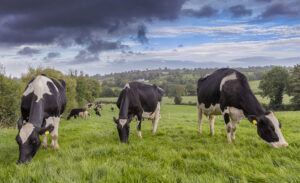December is when most of the spring calving herds will be dried off. Cows should be dried off once production is less than 9 litres per day. Plan to have a 6-to-8-week dry period in order to maximise udder health and correct cow body condition score (BCS). The required length of the dry period varies from cow to cow depending on BCS. Aim to calve cows down at a BCS of 3.25. Cows in poor body condition less than 2.5 BCS require a longer dry period of up to 14 weeks.
Cows can gain up to 1kg liveweight per day during the dry period. However, bear in mind that for the 10 – 14 days at the start and the 10 – 14 days at the end of the dry period the weight gain is minimal. One condition score is equivalent of 50 – 60 kgs liveweight. To achieve weight gain, good quality forage and a pre-calver mineral should be fed.
Cows with a body condition score of 2.5 BCS or less should get 1 – 3 kgs of concentrates depending on silage quality. Taking silage at 65 – 68% DMD cows under 2.5 BCS should be fed 3kgs of ration, cows at 2.5 – 2.75 BCS should be fed 2kgs and cows at 2.75 – 3.0 BCS should be fed 1kg of ration.
Other important issues at drying off would be to ensure your cows are covered for stomach and lung worms, liver and rumen fluke and lice.
Drummonds Dry Cow ration range includes:
• Pre – Calver Primer ration 20%
• Heifer Developer ration 20%
Focus on minerals
Making sure cows are fed enough micronutrients in the run-up to calving is vital to ensure cow and calf health isn’t ompromised next Spring. Farmers should be thinking about feeding micronutrients at least six weeks pre-calving to combat any deficiencies in the diet.
Mineral supplementation plays a vital role in the immune system, cow fertility, colostrum and general production. Deficiencies can lead to serious health issues for both cow and calf. For the cow they include issues such as retained foetal membranes, slow calving, calving difficulty and milk fever.
For calves a maternal deficiency of some micronutrients in late pregnancy can compromise their immune system. This may increase susceptibility to scour, pneumonia, navel ill and joint ill.
With grass silage making up a large part of the diet over winter, we rely on the forage itself to provide some of the required minerals. If the soil cannot supply sufficient trace elements to the plants the animals are eating, a deficiency is likely to occur. Most silage testing services can carry out a silage mineral analysis, this will indicate what is going into a cow and shows when mineral supplementation is needed.
Phosphorus
Phosphorous is important for energy transfer and deficiencies can lead to infertility. However, requirements are very small. Excessive quantities can prevent the uptake of calcium, resulting in milk fever. Recommended levels of phosphorous within a mineral supplement is generally 4-8% depending on forage conditions and concentrate inputs. You must consider again the calcium: phosphorous ratio of the final ration. Elevated phosphorous intake can decrease the action of parathyroid hormone (PTH) leading to an increased likelihood of milk fever.
Magnesium
Magnesium is important for enzyme activation, glucose breakdown and other functions. A deficiency can cause excitability, anorexia, convulsions and salivation. Low magnesium intake interferes with calcium absorption and resorption which increases the risk of milk fever. Magnesium deficiency results in grass staggers. Forage magnesium concentrations will vary with plant species, soil levels, plant stage, season and environment. Legumes such as peas or beans, contain higher levels than grasses, but forage Magnesium levels are roughly twice as much as grains.
Calcium
Calcium is the most abundant mineral in the body, and generally, there are good levels in forage. However, at the start of lactation the calcium requirements are often unable to be met by increasing calcium intake. A lack of calcium in the blood affects the animal’s ability to regulate muscle contractions and relaxation. Milk fever is the main sign of low calcium levels. Symptoms of milk fever include a lack of muscle co-ordination and twitching, slow calving, dry muzzle, depression, bloat, weak pulse, flaccid muscles and death. To meet calcium demands cows must be able to mobilise stored calcium from their bones to meet demands during lactation.Mobilisation of bone calcium is controlled by the parathyroid hormone, which is activated when calcium levels in the blood drop. At the same time another hormone derived from Vitamin D stimulates the kidneys to increase absorption of calcium. If intakes of calcium at calving are enough, these mechanisms to stimulate calcium release from the bones won’t be activated.
Therefore, it is recommended to decrease calcium prior to calving so cows can mobilise calcium from their bones and for the kidneys to increase absorption. Magnesium and potassium levels can both affect the ability of cows to mobilise calcium reserves, so it is important these are correct.
Potassium
Potassium is the third most abundant mineral in the body and is involved in acid-base balance, muscle contraction and nerve function. A deficiency may lead to decreased feed intake and weight gains, poor appetite, and rough hair coat.
Excessive quantities in forage can lead to a reduction in magnesium intake, increasing the risk of grass staggers. Forages are usually a good source (1-4% potassium) and are very high in lush pasture decreasing with age. High potassium levels in forages can affect calcium availability and therefore impact on milk fever incidence.
Iodine
Iodine is a component of the important hormone thyroxine which controls the animals’ energy metabolism. It is also essential for foetal growth and development. Iodine deficiency during pregnancy can cause calves to be born small and weak; an increased incidence of goitre; reduced resistance to hypothermia, decreased survival and low immunity. Cows also tend to retain their afterbirth. Iodine is not stored in the body, which means it must be supplied in the diet. Farmers who have calves born with an enlarged thyroid (goitre) have an iodine deficiency problem and should look to supplement.
At Drummonds we stock a complete mineral range.
For more information talk to your local Technical Sales Advisor.



